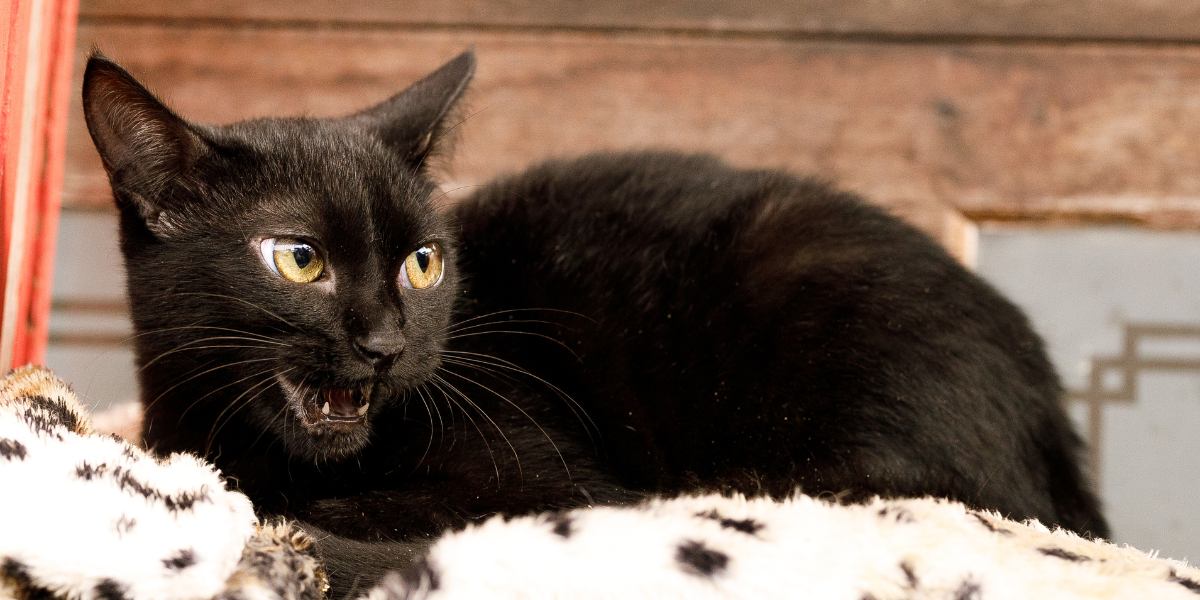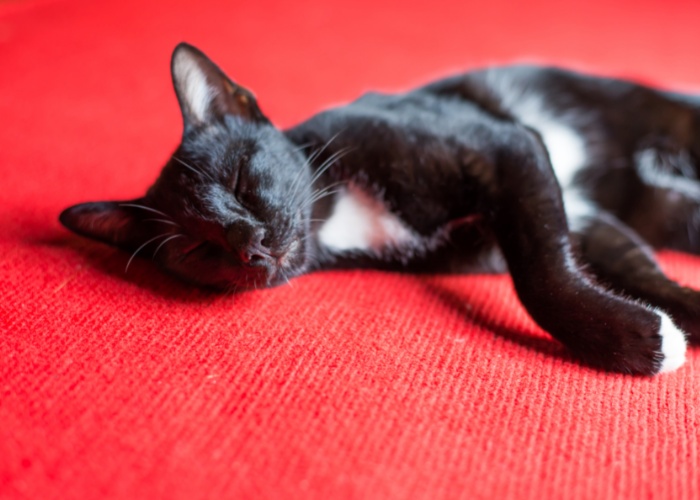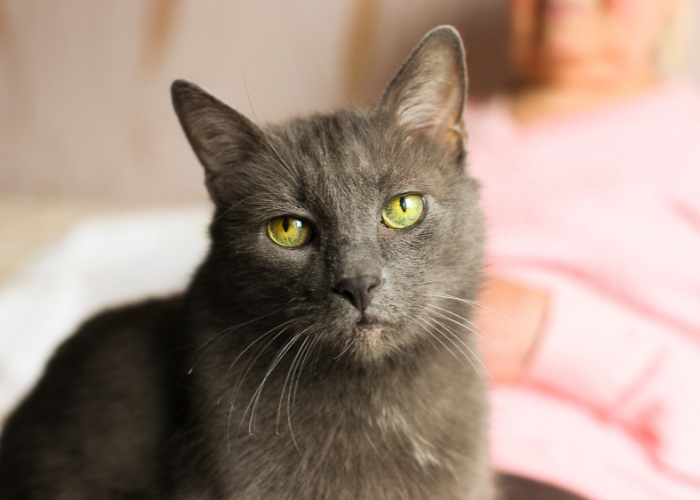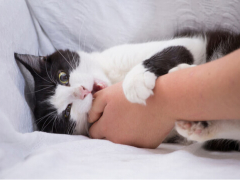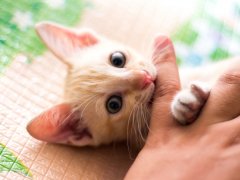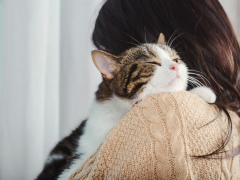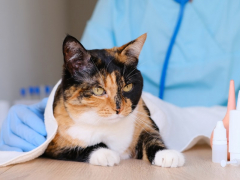Getting a good night’s rest with a cat in the house is sometimes easier said than done. Between midnight zoomies and pre-breakfast sprints down the hallway, sleeping through your cat’s nocturnal shenanigans takes a certain amount of fortitude…and exhaustion.
Besides the obvious racket that comes from your cat’s wakeful wanderings, your sleep schedule also contends with a variety of your cat’s weirdest noises.
Yowls, chirps, trills, and growls–it’s enough to keep you awake wondering what is going on in your furry friend’s sleepless mind. When your cat insists on singing a chorus of strange noises after the sun goes down, knowing that they’re doing it for a reason might help you get some shut-eye.
Why Do Cats Make Weird Noises at Night?
1. They’re Having Fun
Contrary to popular belief, cats are not nocturnal. Instead of sleeping during the day and being awake all night, cats are crepuscular creatures that are primarily active at dawn and dusk.
They sleep both in the day and at night, but the hours when the sun is setting and rising are their favorite times to be alert and ready for action. The anatomy of the feline eye supports this behavior and allows them to see clearly in low-light conditions.
If it’s not quite light outside but your cat is already creating a commotion, you can blame their biological urge to be up and active. Those weird noises you hear could be the sound of your cat having fun and simply being a cat. They might chirp as they stalk a housefly through the living room or chatter along with the early morning birdsong.
2. They’re Stressed
Besides sounds of enjoyment, cats can also spend the night expressing negative emotions. Yowling and low growling sounds can be signs a cat is feeling stressed.
They might also make these sounds during the day, but silence and solitude that come from an otherwise sleeping house can often prompt cats to be more vocal than usual.
Even cats that live in relative luxury can experience stress. A new routine, new pet, a lack of resources, competition for resources, unappreciated attention, a lack of attention–all of these things could potentially cause a cat to stress out.
If you want to sleep better, first you have to figure out what is causing your cat’s stress. Once you take steps to put them at ease, they should stop their anxious vocalizing.
3. They’re Expressing a Need/Desire
Your cat doesn’t care that your alarm isn’t set to go off for another several hours. If their tummy is rumbling, they’re going to let you know. Most cats are content with following a regular feeding schedule that is more accommodating to your sleep schedule.
But if your cat continually demands food at inopportune times, it might be time to adjust the routine. Feeding your cat and filling their water bowl before you go to bed will help.
Your cat also has other needs and desires that aren’t related to hunger or thirst. They might meow in frustration when a favored toy gets stuck under furniture. Or they might think that 4 AM is the perfect time to ask the human to scratch that perpetually itchy spot behind their ears.
4. They’re Dreaming
While it’s impossible to know for sure, scientists are confident that cats dream much like humans.
While it’s impossible to know for sure, scientists are confident that cats dream much like humans. This means that even when your cat is sound asleep, they could still keep you awake with all their strange night noises.
Like people, cats do most of their heavy dreaming while in REM sleep. During this sleep cycle, their minds are just as active as when they’re awake. This often leads to cats making noises that coincide with their dreamy adventures.
It’s almost like a person talking in their sleep. Some cats twitch their ears and tails as they chase those imaginary mice, and they make noises in their sleep as well. Most of these sleep noises sound like low groans, purrs, and sniffles. Your cat’s dream noises might keep you awake if they sleep in bed with you, but it’s best to let sleeping cats lie.
5. They’re Not Spayed or Neutered
Adult cats that have not been spayed or neutered go through phases when they have a biological urge to mate. For females at least four months old, this happens about every 2-3 weeks when they come into a heat cycle.
If they are not spayed, or if they don’t become pregnant, the heat cycles will repeat almost year-round. During heat cycles, female cats yowl to call for mates. They’re often agitated and especially vocal if they don’t get what their bodies are telling them they need.
Similarly, intact (not neutered) male cats will loudly express sexual frustration when you’re trying to sleep. Males don’t go into heat, but their strong noses make them keenly aware of all nearby females that might be interested in mating. They’ll yowl continuously if they can’t find a way to their female friend.
6. They Have Cognitive Dysfunction Syndrome
PetMD reports close to one-third of cats 11-14 years old show at least one symptom associated with this neurological condition.
As cats age, brain cells begin to die off. This is an unfortunate part of a normal life cycle that sometimes leads to Cognitive Dysfunction Syndrome. Similar to dementia in humans, CDS affects memory and normal cognition.
It can cause disorientation, lethargy, restlessness, aggression, changes in sleep, loss of appetite, incontinence, and increased vocalization. Cats with CDS often get confused and anxious at night. They express their distress with loud vocalizations.
PetMD reports close to one-third of cats 11-14 years old show at least one symptom associated with this neurological condition. As cats age, that percentage increases. If you’re concerned your senior cat is making strange noises at night because of CDS, speak to a trusted veterinarian.
When your cat keeps you up at night with their consistent attempts at loud communication, knowing why they’re making those sounds could help you keep them quiet. Reducing their stress, feeding them at night, or spaying or neutering them could solve both of your problems. It’s also possible, however, that your cat is simply being a cat.
Some cat breeds are known for being especially vocal. You can shut them out of your room (although that could cause more problems when they protest the closed door) or invest in a pair of earplugs. Either way, know your cat’s night noises are most likely perfectly normal.
